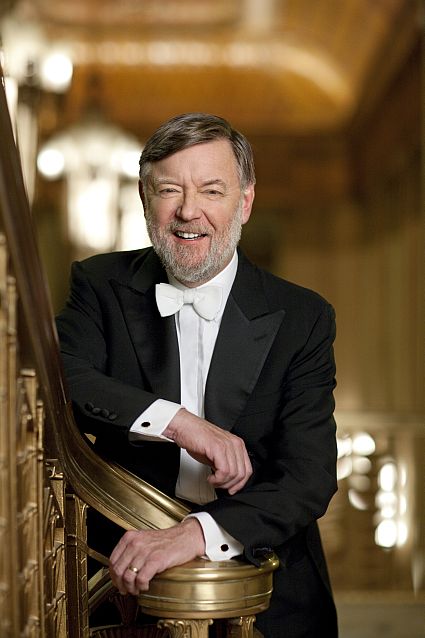
 United Kingdom Three Choirs Festival [3] – Elgar: Judith Howarth (soprano), Andrew Staples (tenor), David Shipley (bass), Three Choirs Festival Chorus, Philharmonia Orchestra / Sir Andrew Davis (conductor), Hereford Cathedral, 30.7.2018. (JQ)
United Kingdom Three Choirs Festival [3] – Elgar: Judith Howarth (soprano), Andrew Staples (tenor), David Shipley (bass), Three Choirs Festival Chorus, Philharmonia Orchestra / Sir Andrew Davis (conductor), Hereford Cathedral, 30.7.2018. (JQ)

Elgar – Scenes from the Saga of King Olaf, Op.30
Just a couple of days after presenting one rarely heard English choral work, Dame Ethel Smyth’s Mass in D (review), the Three Choirs Festival offered us an opportunity to hear another, this time by Elgar. The Smyth work had been performed at the Festival before, albeit ninety years ago, but Elgar’s cantata, Scenes from the Saga of King Olaf was tonight making its Festival debut. This surprised me somewhat since Elgar’s music was a foundation stone of Three Choirs throughout the twentieth century and to the best of my knowledge every other significant choral work by him – even The Black Knight – has been performed at least once. I can’t readily think of any reason why King Olaf has missed out. The best conjecture that I can come up with is that the work dates from 1896 and within a very few years I suppose it had been overshadowed by the three great oratorios which then came to dominate Festival programmes for many decades.
I think it would be fair to say that King Olaf is a rarity in concert halls today. Happily, Elgarians have had the chance to hear it and evaluate it through the medium of two very fine recordings. First, in 1985, came Vernon Handley’s recording and then in 2014 a second recording was made. Appropriately for a work that is based on Norse sagas, that recording was made in Bergen and at the helm was tonight’s conductor, Sir Andrew Davis (review). Sir Andrew, who has been a welcome Three Choirs guest on several occasions in recent years, has form when it comes to revivals of less favoured Elgar works. He presided over a fine account of Caractacus at the 2011 Festival in Worcester (review). Then, as now, his soprano soloist was Judith Howarth.
King Olaf was composed in 1895-96. It was designed for performance at the 1896 North Staffordshire Festival though I was intrigued to learn from Richard Bratby’s programme note that Elgar was promised a performance by the Festival but no fee! For his libretto Elgar turned to the poetry of the American Henry Wadsworth Longfellow (1807-1882) and specifically to his collection Tales of a Wayside Inn (1863) in which one of the characters related the Saga of King Olaf. Elgar enlisted the help of his Malvern neighbour, H A Acworth to edit Longfellow’s verse down into manageable proportions. Two years later Acworth would provide an original libretto for Caractacus. Frankly, neither libretto is exactly a literary masterpiece, especially viewed from a 21st century standpoint. The Longfellow/Acworth libretto for King Olaf is more of a narrative than is the case in Caractacus and I think that one of the problems with King Olaf is that the words don’t always give the listener a properly clear idea of what is actually going on, still less of the overall context in which some scenes take place.
The cantata relates a number of episodes from the life of Olaf. He brings Christianity to his native Norway, subduing and killing his rival Ironbeard, who refused to accept the new faith, after which the people are converted to Christianity. Olaf then marries Ironbeard’s daughter, Gudrun but she is set on avenging her father and tries to assassinate Olaf on their wedding night. We’re not told what then happens to Gudrun but she’s clearly removed from the picture because Olaf subsequently tries to marry Sigrid (a second role for the soprano soloist) but he’s out of luck with her too: she flees and marries King Svend of Denmark. Perhaps hoping it will be a case of third time lucky, he then woos Thyri, the former wife of King Burislaf of Wendland and she seeks his help in recovering land from Burislaf. That request leads to Olaf’s undoing for his attempt to do Thyri’s bidding results in his death in battle.
It’s been a little while since I listened to either recording of King Olaf but in preparation for this concert I revisited the Davis recording. Doing so reminded me that one of the most impressive features of the work is the orchestral scoring. Elgar’s skilful and colourful orchestration came out very strongly also in tonight’s performance with the Philharmonia on very fine form. It’s commonly held – and rightly so – that the ‘Enigma’ Variations (1899) represented a quantum leap for Elgar in terms of his skill and flair as an orchestrator. However, as I listened tonight there were many instances where it was possible to discern that in 1896 Elgar was already very close indeed to achieving mastery of scoring that is associated with ‘Enigma’ and the major scores that followed. Tonight, the Philharmonia excelled in terms of the finesse that they brought to many passages of colourful delicacy in the scoring and, when appropriate, there was dash and power in their playing, too. I found it instructive to compare Elgar’s use of the orchestra with that of Ethel Smyth. The latter had the benefit of formal training in Leipzig while Elgar was largely self-taught, but comparing Smyth’s Mass and King Olaf I am in no doubt whatsoever which composer had the greater genius as an orchestrator. Furthermore, though Elgar had an often exciting and martial tale to tell he was much more restrained – and effective – in his use of brass and percussion; or maybe the Philharmonia were kept on a tighter leash tonight by Sir Andrew. I also felt it was clear that Elgar had a much stronger melodic gift than Smyth.
The chorus has a significant role in King Olaf and let there be no doubt: the Festival Chorus did a sterling job. Their singing was excellent throughout and they projected Elgar’s music with relish. The choral writing, though plentiful and often exciting, is not as consistently interesting as the orchestration. I think the problem may well be, as I observed when reviewing the Davis recording, that a lot of the choral music is narrative in nature and I don’t think Elgar had quite worked out how to get a choir to tell a story. (By contrast, in the oratorios, the choir’s role is more often that of commentator, which is easier to handle, I think.) A prime example of this issue comes in the section entitled ‘The Wraith of Odin’ where the choir narrates the story of Olaf’s banquet during which Olaf receives a less-than-welcome guest in the shape of the ghost of Sir Morten of Fogelsang. I couldn’t fault the verve and commitment with which the Festival Chorus put this episode across but the choral music itself seems, dare I say, a bit Provincial. As I listened tonight I thought of the graphic way in which Mahler involves the chorus in the narration of unhappy stories in Das klagende Lied (1880). At this stage Elgar can’t really match that, but he wasn’t that far off, as a foreshadowing of the Demons’ Chorus in Scene 5 (“As leap the lights of winter”), particularly in the orchestra, demonstrated. I greatly admired and enjoyed the contribution of the Festival Chorus, Oddly, the one slight disappointment came in the best-known passage from the work, ‘As torrents in summer’. There are two stanzas, the first of which is clearly marked piano in the score at the outset while its successor is mezzo forte. To my ears, both verses were begun at the same dynamic – the louder one. However, that was a small blemish amidst a choral performance that otherwise gave great pleasure.
Of the three soloists it’s the tenor, as Olaf, who has the most to do. Fortunately, in Andrew Staples we had just the man for the job. Two years ago I saw him in another high profile Elgar assignment when he stepped in at extremely short notice to sing the title role in Daniel Barenboim’s performance of The Dream of Gerontius in Berlin (review), a performance which was subsequently issued on CD (review). I admired his achievement then but tonight, with proper notice of the engagement and time to prepare, he was even more impressive. From the outset his tone was ringing and clear. High notes were hit heroically and truly and he was thoroughly convincing as the noble warrior hero. Just as impressive was his singing in the more delicate stretches of the role and he brought a fine sense of rapture to his extended duet with Sigrid. This was an outstanding performance.
Bass David Shipley had a fine evening too. He sang very well and had the vocal and physical presence that the bass role requires. He was able to summon up suitably black tone when singing as Ironbeard and both in that guise and in his narrative passages I found him very convincing. Judith Howarth had some good moments but, overall, I was less taken with her performance. The trouble lay chiefly in the use of vibrato which was much more pronounced than either of her male colleagues. As a result, there was a tendency to spread notes in her top register and even though I was following the text I often found it hard to discern the words.
Sir Andrew Davis led a dynamic, dramatic account of the score. As we’ve seen before at Three Choirs, he has the ability to galvanise his forces, as he did tonight. He certainly injected energy and vitality into the performance. If I have a criticism it would be that on some occasions he could, with advantage, have relaxed a bit more. The stopwatch isn’t by any means the most reliable of guides to musical interpretation but by my watch the performance, given (rightly) without an interval lasted for approximately 83 minutes. By comparison, Sir Andrew’s own recording plays for 94:55 and the Vernon Handley version takes 108:44. So, I think there was scope for some relaxation. On the other hand, the dramatic urgency that Davis brought to the music overall made for an undeniably exciting evening.
By comparison with the later major choral works King Olaf has its weaknesses. However, it has many strengths too and when it receives a convinced and convincing performance such as this those strengths are made apparent. The cantata has had to wait 122 years to reach the Three Choirs Festival. It’s never going to be a repertoire piece but this highly enjoyable, vivid performance made a strong case for it and surely the work won’t have to wait as long again to achieve another airing at Three Choirs.
John Quinn
